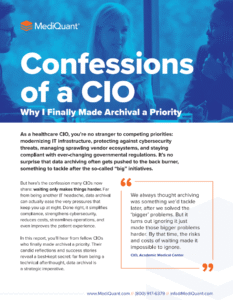Generative AI Underlines Continuing Value of Healthcare Data Archiving Solutions
Written By: Jim Jacobs, President and CEO, MediQuant
An AI platform that turns clinicians notes into structured data within seconds. A virtual assistant that gathers 20,000 nurse handoffs per shift.
AI in healthcare is no longer just hype — it’s actively being implemented to enhance clinical care and operational efficiency. Generative AI offers health systems and hospitals the ability to derive more value from patient claims, monitor payers more closely, equip physicians with useful information at the point of care, and much more.
Driving these advancements, however, requires relevant data — even hospital archive data from 10 or more years ago — that has been normalized and made available to current software. Preserving data in a central repository ensures it’s continually accessible and usable by hospitals to bolster finances, improve workflows, and take better care of patients.
1. Keeping Payer Scorecards for Oversight

2. Recovering Revenue Via Denial Management
3. Helping Physicians at the Point of Care
How Health Data Archiving Enables Data Usefulness
Many hospital executives still imagine an archive at the center of various legacy systems, with arrows pointing from legacy systems to a central repository where information is stored as systems are retired. There are no arrows leading from the repository. In this view, an archive is static, the place where archived data goes to die.
With the rise of generative AI, however, executives are realizing that historic data retains its value for much more than compliance and release-of-information use. While arrows should lead from legacy applications to the data repository, arrows should also emanate from the repository, fueling secondary uses that include billing and collections, patient care, claims management, and medical research.

But not all healthcare data archiving solutions are created equal. For data to be useful for secondary purposes and tactical use cases, it must be discrete, accurate, and reliable — traits that not all archive vendors can meet.
More Thought-Leadership
Your EHR Isn’t the Whole Story. Healthcare Data Archiving Fills the Gaps.
You want better care, stronger outcomes, and patient experiences that build trust? Then your providers need more than just today’s patient charts. They need access to the full patient history, including the data within HIT applications that are no longer in use. ...
Technical Debt Is Quietly Killing Your IT Strategy
Why CIOs Say Application Rationalization Is the Best Line of DefenseIf your IT application portfolio were a closet, half would still have tags. A quarter wouldn’t fit. And the rest? No one remembers buying. In hospital IT environments, the more outdated apps you’re...
Leading the Way in USCDI Compliance: How MediQuant’s Active Archives Deliver Strategic Value
In an era where healthcare data management is more complex than ever, staying ahead of regulatory requirements is a strategic advantage. At MediQuant, we recognized early on that the future of healthcare data archiving solutions would require more than just storage –...
Contact Us Today








